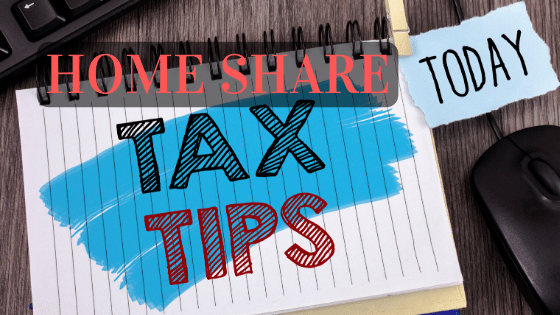Don’t sell yourself short come tax time. Get the most out of your Airbnb deductions with these top tax tips. Follow these tips to make tax time a breeze and maximize your deduction. If you’re earning rental income, you can’t afford to miss it.
Best Tax Tips for Airbnb
These Airbnb tax tips will help you maximize your home-share deductions.
1. Keep Accurate Records from the Beginning
The best thing you can do is to start organizing your tax records from the beginning. Keep records of all bookings, vacancy dates, and other notes so that they will be ready when it comes time to file. This makes tax time easy, and it is more likely that you will not miss a deduction. Keeping a property calendar is an excellent way to determine if you can take certain deductions and to take advantage of any special programs for which you might qualify.
When setting up your business, be sure to have a designated place for your tax records. Have a place to store receipts and have a file in your computer for electronic receipts. You can always print them out, too. A little planning and forethought, in the beginning, will save you many hours when it comes time to prepare your taxes or get ready for your accountant.
2. Use Accelerated Depreciation and Cost Segregation
One deduction many property owners miss is depreciation on a rental property. This allows you to write off the cost of purchasing or improving your rental property. Depreciation and cost segregation is a deduction that is in addition to any other business expenses you might have. This can significantly add to your Airbnb business deductions.
Also, do not forget that you can claim a tax deduction on many major equipment purchases, too. If you purchased a big lawn tractor to maintain the property, then you might be able to take depreciation on it. Are you picking guests up from the airport? If you are, then a portion or all of your vehicle might count for this deduction. Furthermore, you should consult a tax accountant who specializes in Airbnb taxes to ensure you’re getting suitable advice.
3. Track and Claim All Deductions
This is one of the most important Airbnb tax tips. Tracking is the most important factor in making sure that you do not miss out on any important deductions. Make sure to keep receipts for all expenses, even if they are electronic ones. You can also prorate expenses where necessary.
You should keep records, such as electric bills, water bills, maintenance invoices, specialized rental fees, and occupancy fees. Furthermore, you should also keep any receipts for Internet provider bills, plus websites and advertising expenses. You should also document any purchases related to taking care of your guests.
Don’t forget to keep receipts for any office expenses, too. Little things add up, so always keep your receipts. It could make a big difference at the end of the year. A printer cartridge only costs $30 a month, but it can add up to a $360 deduction by year-end.
Keeping your receipts in one place will save time, as you will not have to look back in bank records to determine these deductions. In the end, if you do not have a receipt, it did not happen as far as the IRS is concerned.
4. Reconcile Airbnb 1099-K Forms
Make sure that all your earnings match your Airbnb 1099-K, if you received one. Ensure your reported totals exactly match your 1099K form. Otherwise, you could end up with a substantially larger tax bill.
To receive a 1099-K, you must earn over $20,000 in a calendar year, and you must have completed 200 or more transactions. Airbnb will also report your rental income to the IRS, so make sure you keep track of your earnings and deductions to make sure that your records match what the IRS has.
Some home-sharing platforms will keep a percentage of your earnings, at around 28%, if your W-9 is not filed or properly reported to the IRS. This is an automatic withholding penalty from the home rental company. You could also face fines and other penalties from the IRS if you don’t fill out these forms properly.
5. Get Professional Tax Advice
Our final Airbnb tax tip is one of the most important. Get professional tax advice!
Renting your home for income is different from working a W-2 job. Income from Airbnb operates under complex rules, and a tax specialist can help you make sense of them. Using a professional tax preparer will also minimize the risk of audit-triggering mistakes and penalties.
Airbnb hosts should understand how to treat rental property income in various states, and tax jurisdictions. A professional can make sure that you meet all the requirements and can help you identify all the potential deductions to which you are entitled. However, you should have all your records on hand to ensure your tax pro has accurate info.
How Short-Term Rental Hosts Are Taxed
Short-term rental hosts must determine whether they need to file Schedule C or Schedule E. You need one of them to report Airbnb, VRBO, and HomeAway earnings to the IRS. For some short-term rental hosts, rental income is passive income. Passive income falls under Schedule E, which does not subject to self-employment taxes (15.3%). In certain cases, hosts will need to file a Schedule C to reflect their short-term rental property if it is considered active. Taxpayer should discuss with their tax advisors which is more favorable and whether the position is defendable. Publication 925 which addresses active businesses states that if the average rental period is less than 7 days, a Taxpayer may elect active treatment and file a Schedule C.
Note that once a business has filed either form, you may not change the designation unless material changes take place in the business.
Schedule C and Self-Employment Tax
Schedule C is used to report business income. In most cases, Schedule C filers are also required to pay self-employment tax, including Social Security and Medicare tax.
In most cases, you must make estimated payments toward self-employment taxes every quarter. You must make estimated payments if you expect to owe $1,000 or more in taxes, or you will be assessed an underpayment penalty.
Loss Treatment
It’s important to also recognize the differences between losses in a Schedule C and E. When filed on a Schedule E the losses are suspended and used against future profits or against any gains upon sale in the future. When filed on a Schedule C, those losses can offset other income and claw back taxes paid from other sources such as your regular 9 to 5 job (W2 income).
While filing a loss on a Schedule C may generate a lower tax liability in the current year, the taxes on selling an asset used in an active trade or business may result in depreciation recapture at your ordinary rate, so there could be a higher tax impact over time.
You should also note that taking Schedule E losses can result in suspended passive losses. If you sell your property for a loss or breakeven, you can’t use these losses. We highly recommend consulting with a tax expert before deciding between Schedule C or E because the decisions could have a significant tax impact.
Local and State Occupancy Taxes
Some municipalities also charge additional taxes for occupancy. You might owe occupancy taxes (AKA lodging tax, room tax, hotel tax, etc.) on your rental income. Several factors determine the cost of occupancy tasks. Some contributing factors include the price of your rental and add-on fees, like for cleaning services or extra guests.
Guests usually pay occupancy taxes through the home-share platform. However, the responsibility ultimately falls on the host. It’s up to you to determine if occupancy taxes are covered.
In some jurisdictions, Airbnb will collect and remit these taxes on your behalf. However, in others, you will be responsible for ensuring that these taxes are paid. To view a complete list of the cities where Airbnb collects occupancy taxes, click here.
Get Help With Airbnb Deductions
Contact the pros at Shared Economy Tax to make sure you’re getting the most out of your Airbnb deductions. It could save you big come tax time. Contact us now to schedule a free one-on-one strategy session with a Shared Economy Tax Pro, or sign up for our newsletter for free tax tips and more.

